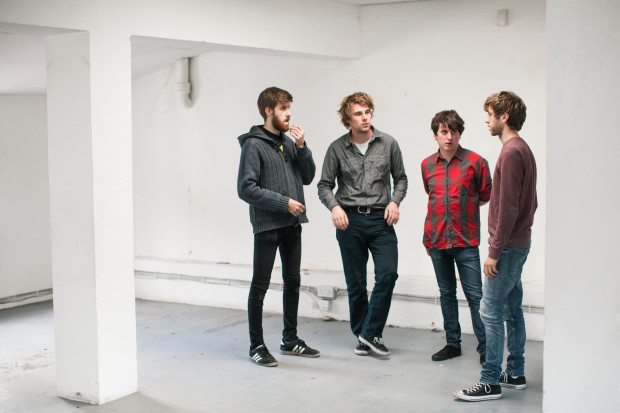Call Super’s bios on Twitter and Tumblr read “confuse, construct”. It’s important to bear in mind when navigating his ever-growing catalogue — just when one thinks he’s settled on a style or direction, he upends expectations and jumps into something either head-bangingly intense or daringly mellifluous. Following the impeccably layered and textured Suzi Ecto full-length for Houndstooth last year his next release was the two-track Fluenka Mitsu EP for Greek label Nous Disques, the first of which sounded nothing like anything he’d released before. Rolling, rumbling melodies run unchecked for 10 solid minutes on ‘Fluenka’s Shelf’, while thunderous echoes abound overhead and faint darts of colour appear like fireworks or bursts of paint in the sky. To my ears, the track it most closely resembled was Simon’s ‘Free At Last’, a prog-house workout that featured on mix CDs galore at the turn of the millennium. The flip-side, ‘From Which I Fell’, sees Call Super in more familiar territory — mechanical hissing, searing loops of melody and a mood at once sinister and wistful.
For his return to Houndstooth he goes brighter rather than darker, with dance-floor cuts that are somehow both muscular and floral; a muted celebration. ‘Migrant’ kicks off with pounding kicks similar to those heard on ‘Depicta’ and ‘Informer’, while hazy synth washes drift in the distance. A sort of mutated tape squawk comes to life at the end of each bar, loon like, as the track moves from the heavy techno of recent ventures into more effervescent mode. Even the up-down bass line has more in common with the kind of 90s house of his beloved Danny Tenaglia than any contemporaries. A xylophone melody kicks in halfway through, ramping up emotion and possibly standing as the most focused and direct treble sound he’s made in some time. The track (and release) title feels important. In the current media climate, it’s an act of defiance to name something so beautiful, so joyous after what is so often used as a dirty word (incorrectly substituted, in most cases, for refugees attempting to travel into Europe and from Calais into the UK). Cameron’s “swarm” speech stands as the nadir of such language, demanding borders physical and figurative. Speaking about Suzi Ecto to Rory Gibb of The Quietus about the early politics of dance music last year, Call Super said that the intent of early rave music “wasn’t emo heads-down darkness”: “The basis of that music — what the musicians were trying to communicate at that time — was bliss.” Such bliss is palpable on ‘Migrant’, inclusive, worldly bliss that does not discriminate or divide but welcomes.
While not entirely blissful, the elegiac ‘Meltintu’ (Melt into? Melt in two? Melt into you?) deals with subdued melancholy. It’s driven by a similarly playful bass line, but the most engaging point is when, with little foreshadowing, a striking melody arrives: bursting into life in kaleidoscopic fashion, it’s part nightmarish carousel ride, part Balearic anthem. Metallic clanks similar to those in Ondo Fudd’s ‘Coup D’État’ ground it in the JR Seaton catalogue, yet the overall feeling is of something fresh, both familiar and unknown. Its richness of melody was foregrounded last week when Midland mixed it into STL’s ‘Heaven’s Vape’ on the last of his August residency shows on Rinse FM. It is confusing, unexpected, but builds on a body of work from a producer who seems incapable of putting out a release that fails to stir deep emotion while retaining a bolstered sense of dance-floor heft. Aidan Hanratty






